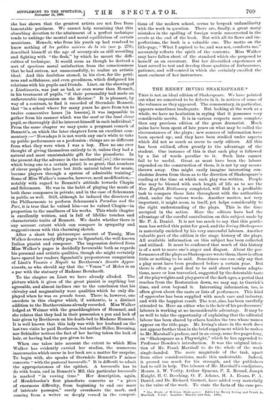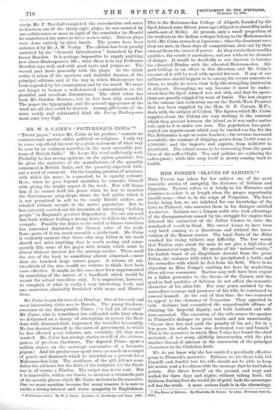THE HENRY IRVING SHA.KESPEA.RE.*
Tins is not an ideal edition of Shakespeare. We have pointed out what we conceived to be defects in it, in notices of some of the volumes as they appeared. The commentary, in particular, appears sometimes inadequate. But looking at the work as a whole, we have no hesitation in saying that it possesses very considerable merits. It is in various respects more complete than any previous edition of the great dramatist. Much pains have been spent of late years on what may be called the circumstances of the plays ; new sources of information have been opened up ; and they have been studied under aspects which did not so much as occur to early editors. All this has been utilised, often greatly to the advantage of the student. One instance of this is that each play is followed by a list of words peculiar to it. Such lists cannot fail to be useful. Great as must have been the labour expended on the construction of them, it is not by any means thrown away. One might easily imagine interesting con- clusions drawn from them as to the direction of Shakespeare's reading at the time at which each play was written. People who may be blessed with such length of life as to see the New English Dictionary completed, will find it a profitable task to compare these lists throughout with the authorities cited, under the various words. Another matter, not very important, it might seem, in itself, yet helps considerably to the right understanding of the plays. This is the time occupied in the action. Here the editors have bad the advantage of the careful contribution on this subject made by Mr. P. A. Daniel. It is not too much to say that this gentle- man has settled this point for good, and the Irving Shakespeare is materially enriched by his very successful labours. Another valuable part of the edition is the stage history of the plays. All available information on this subject has been collected and utilised. It must be confessed that much of this history is of a sort to move one's anger and disgust. About the per- formances of the plays as Shakespeare wrote them, there is often little or nothing to be said. Sometimes one can only say that a play must have been produced before a certain year. But there is often a good deal to be said about various adapta- tions, more or less travestied, suggested by the detestable taste of the playwrights and playgoers of the dark ages, a period that reaches from the Restoration down, we may say, to Garrick's time, and even beyond it. Interesting information, too, is often given about the casts or lists of performers. This kind of apparatus has been supplied with much care and industry, and with the happiest result. The text, also, has been carefully attended to. Here an editor who is the heir of his predecessors' labours is working at no inconsiderable advantage. It may he as well to take the opportunity of explaining that the editorial labour has been shared by others besides the two whose names appear on the title-page. Mr. Irving's share in the work does not appear further than in the brief supplement which he makes to Mr. Marshall's preface, and in an essay, some five pages long, on " Shakespeare as a Playwright," which he has appended to Professor Dowden's introduction. It was the original inten- tion of Mr. Frank Marshall to do the whole of the work single-handed. The mere magnitude of the task, apart from other considerations, made this undesirable. Indeed, it proved too much for his strength, and the publishers had to call in help. The labours of Mr. Marshall's coadjutors, Messrs. A. W. Verity, Arthur Symons, P. Z. Round, Joseph Knight, H. C. Beeching, 0. F. Adams, H. A. Evans, P. A. Daniel, and Dr. Richard Garnett, have added very materially to the value of the work. To state the facts of the case pre- • The Works of William Skit. speare Edited by Henry Irving and Frank A. Marshall. 8 vol.. London Blaekie and Bon. 1990.
cisely, Mr. F. Marshall completed the introduction and notes to fourteen oat of the thirty-eight plays ; he was assisted by one collaborator or more in eight of the remainder (to Hamlet he contributed the notes to three scenes only). Sixteen plays were done entirely by other hands. The poems have been annotated by Mr. A. W. Verity. The edition has been greatly enriched by the "General Introduction" furnished by Pro- fessor Dowden. It is perhaps impossible to supply anything new about Shakespeare's life ; what there is to say Professor Dowden says well, and with good taste and judgment. The second part deals generally with the plays. In the third, notice is taken of the spurious and doubtful dramas, of the principal editions, and of the way in which Shakespeare has been regarded by his countrymen and by the world. We must not forget to bestow a well-deserved commendation on the plentiful and excellent illustrations. The chief artist has been Mr. Gordon Browne ; but he has been ably seconded. The paper, the typography, and the general appearance of the work are all that could be desired. Among gift-books of the more costly and substantial kind, the Irving Shakesp eare must rank very high.



















































 Previous page
Previous page